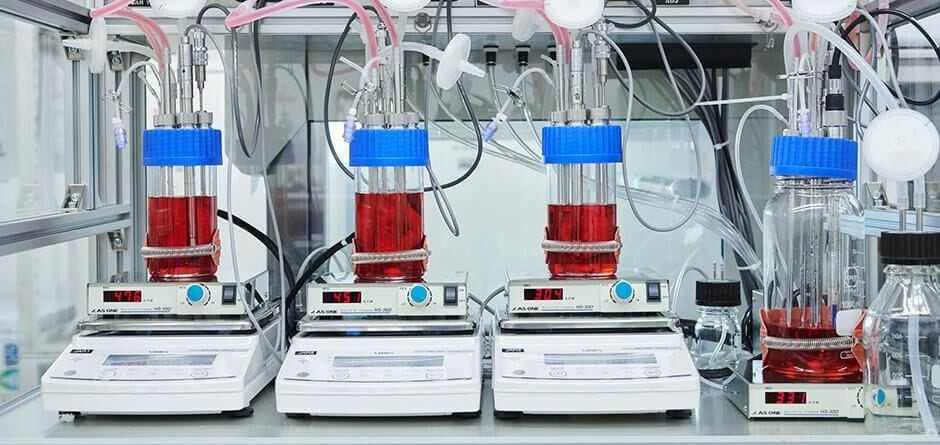Two of Asia’s highest-funded alt-protein startups have joined forces to bring cell-based seafood to the masses.
Japan’s IntegriCulture and Singapore’s Shiok Meats have signed a collaboration agreement which will see them scale up production of the latter’s flagship product: cultured shrimp meat.
[Disclosure: IntegriCulture has received investment from AgFunder, which is AFN‘s parent company. Read more here]
Together, the two companies will develop inexpensive cultured serum for growing shrimp meat in the lab. This will negate the need for Shiok Meats to buy pricy growth serum or growth factors in relatively large quantities from third parties, IntegriCulture co-founder and CEO Yuki Hanyu tells AFN.
To achieve these objectives, Shiok Meats will be leveraging two of IntegriCulture’s technologies.
SpaceSalt is the Japanese startup’s food-grade cell culture medium. Such concoctions are the primordial soup of cellular agriculture, containing a mixture of nutrients — including proteins, carbohydrates, fats, vitamins, minerals, and various other goodies — that enable animal-derived cells to grow into meat suitable for human consumption.
Basal culture medium needs to have external growth factors, typically in the form of serum, added into the mix in order for the cells to survive and thrive.
“We provide a very simple shortcut to commercialization of cell-based meat, by offering a solution to the most pressing technological challenges in cellular agriculture – growth factors,” Hanyu says.
That’s where the second tool IntegriCulture’s providing to Shiok Meats comes into the picture. The CulNet System is the Japanese startup’s ‘plug and play’ cell culturing kit, designed so that enterprise customers can set up in-house cell ag operations rapidly, easily, and (relatively) cheaply.
Crucially, the system is capable of culturing its own serum, reducing reliance on externally sourced growth factors.
The company describes CulNet as a system of “species-blind, scalable, inexpensive cell culture protocols.” It has already been used to successfully grow beef and poultry, and can culture cells up to five times less expensively than conventional methods as it doesn’t require externally added growth factors or serum, the startup claims.
This ‘out of the box’ solution may prove attractive for prospective clients, not only in food production, but also cosmetics, materials, pharmaceuticals, and other industries. In fact, alongside its maiden food offering — cultured foie gras that’s due to go on sale to the public sometime next year — IntegriCulture is also bringing out its own line of skincare products.
“This collaboration potentially demonstrates the versatility of the CulNet System, which in theory can culture cells of any type and species without any exogenous serum or growth factors, but with food-grade basal medium only,” Hanyu says.
“The problems [with externally sourced growth factors and serum] include the extreme costs of what is currently available in the market, regulatory issues as serum or growth factors are currently not approved as food or food additives, and questionable consumer acceptance.”
Many consumers maintain inaccurate and often negative perceptions about the raw materials and production processes behind cultured meat, equating it with medical procedures such as hormone therapy, he added.
What’s more is that much of the serum currently available for producing cell-based meat is a by-product of animal slaughter, defeating the object of securing an ‘animal-free’ food source.
“This doesn’t make sense for cell-based meats as it is neither ethical nor sustainable,” Sandhya Sriram, co-fpunder and CEO at Shiok Meats, told Vegconomist. “Also, serum is expensive. Hence, most cell-based companies are looking into serum alternatives that are edible, plant-based, inexpensive, and sustainable.”
According to AgFunder’s ASEAN Agrifoodtech Investment Report 2020, Shiok Meats was Southeast Asia’s top-funded startup in the Innovative Foods category last year, netting a total of $5 million. It raised a further $3 million in a bridge round last month.
IntegriCulture raised $7.4 million in Series A funding in May from investors including AgFunder, Beyond Next Ventures, Hiroshima Venture Capital, NH Foods, Real Tech Fund, and VU Venture Partners. It secured around $2.79 million in a Real Tech Fund-led seed round in June 2018.
Got a news tip? Email me at [email protected]





